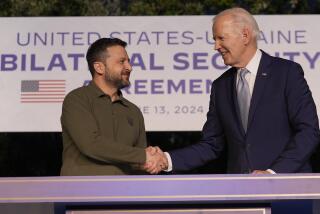Nations Agree to Make Nuclear Pact Permanent
- Share via
UNITED NATIONS — In a step the Clinton Administration hailed as “a gift to next generations,” most countries of the world agreed Thursday to make permanent the 25-year-old treaty banning the spread of nuclear arms.
Support for the U.S.-backed, indefinite renewal of the Nuclear Non-Proliferation Treaty was so overwhelming that it was approved without a recorded vote after Washington and the four other acknowledged nuclear powers accepted the goal of total elimination of all atomic armaments, albeit without setting a deadline.
A jubilant Madeleine Albright, U.S. ambassador to the United Nations, said Thursday’s action “should make the world a safer place for us and for our children. . . . We have provided a gift to next generations.”
The treaty makes it a violation of international law for any country to acquire nuclear arms--except for the five nations that possessed them when the pact was enacted.
The United States, the Soviet Union, Britain, France and China were allowed to keep their arsenals. Russia replaced the Soviet Union in the nuclear club.
Non-nuclear countries that sign the treaty are required to agree not to develop nuclear arms and to allow international inspection of their civilian facilities to prevent diversion of technology or material to weapons purposes.
The quarter-century experience with the treaty demonstrates that the protection is imperfect. Since the accord took effect in 1970, at least four countries--Israel, India, South Africa and Pakistan--have developed clandestine nuclear weapons. Others, such as Iraq and North Korea, have come close to doing so. Iran may be on the way.
Israel, India and Pakistan refused to sign the treaty, so their nuclear programs are not subject to safeguards.
Iraq, North Korea and South Africa are parties to the treaty but were able to circumvent inspections. South Africa has given up its nuclear ambitions and claims to have destroyed its weapons. The Iraqi and North Korean programs have been thwarted--at least for now.
Nevertheless, U.S. officials estimate that without the treaty, the nuclear club might have expanded to as many as 40 members, creating the grave danger that atomic arms would reach the black market or fall into the hands of terrorists.
Secretary of State Warren Christopher said at the start of the monthlong conference that the treaty’s success is difficult to measure because it is counted in “arms that were not built” and “nuclear wars that were not fought.”
John Holum, director of the U.S. Arms Control and Disarmament Agency, acknowledged that the treaty “is not the whole answer” to the dangers of nuclear proliferation. But he said the pact is vital as an expression of international opposition to the spread of nuclear arms and as the legal basis for sanctions against violators.
Sanctions were imposed against Iraq, and North Korea agreed to freeze its nuclear weapons program in the face of sanctions.
Holum said clandestine programs were allowed to get started because the International Atomic Energy Agency, which enforces safeguards required under the treaty, lacks the authority to take action unless it sees a clear violation. By that time, programs can be far along.
*
The Iranian program offers a case in point. Tehran has promised to place reactors it is trying to buy for $1 billion from Russia under international safeguards as required by the treaty. The IAEA says that is enough. And U.S. officials, who have bitterly opposed this sale, acknowledge that the deal is legal, as far as the nuclear accord is concerned.
Still, the Administration says it has intelligence that Iran is trying to acquire nuclear weapons.
“If this program goes ahead unchecked, at some point the IAEA will be able to detect it,” Holum said. “By that point, it will be far along, and it would be much more difficult to turn around.”
The most obvious loophole in the non-proliferation accord is that states voluntarily agree to abide by it. But 178 countries have signed up, making it the second-most widespread treaty in the world, behind the U.N. Charter.
Sixteen countries remain outside its purview. But of the non-signatory nations, only Israel, India, Pakistan, Brazil and Chile are believed to have the capacity to produce weapons. Chile has announced plans to sign; Brazil is expected to do so.
Even the programs in Israel, India and Pakistan are hampered by treaty restrictions, as other countries are barred from cooperating with their nuclear programs.
The pact has been less successful in encouraging the five nuclear powers to get rid of their arsenals.
Although the pact called for “good-faith efforts” to negotiate nuclear disarmament, the total stockpile of nuclear weapons is far larger than it was 25 years ago.
The conference also called for meetings every five years to assess the treaty, even though it is now permanent. The accord was originally adopted for a 25-year term with a provision allowing member countries to decide by majority vote whether to allow it to expire, extend it for a limited number of years or extend it indefinitely.
Conference President Jayantha Dhanapala of Sri Lanka announced that there was a majority to make the pact permanent; when no country objected, he gaveled the measure through without a vote.
The extension came after the conference papered over a last-minute dispute about an Arab demand for criticism of Israel for its refusal to sign up.
The United States refused to go along with censure of its ally.
After all-night negotiations, the United States, Britain and Russia agreed to sponsor a resolution calling for elimination of nuclear arms from the Middle East without citing Israel by name.
More to Read
Sign up for Essential California
The most important California stories and recommendations in your inbox every morning.
You may occasionally receive promotional content from the Los Angeles Times.













